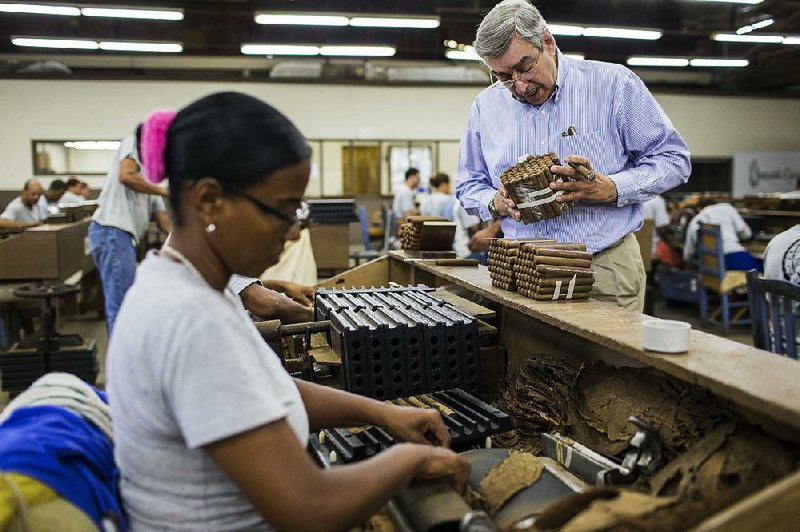Radhames Rodriguez is using a rare tobacco and special wrapper to roll 50,000 of his new premium cigars, the Pulita, in the Dominican Republic. U.S. aficionados shouldn't get their hopes up, though -- the limited-edition cigar won't be on sale anywhere near them.
Named after Rodriguez's grandfather, who started the business sixty years ago, the Pulita will only be marketed in Europe. That's because Rodriguez can't face the headache and cost of complying with the U.S. Food and Drug Administration's new tobacco regulations.
"It just costs too much and takes too much time," said Rodriguez, vice president of Tabacalera El Artista. "We're going to focus on the German and Italian markets instead."
Since August last year, every time Artista or other cigar makers introduce a new product for the U.S. market, they must gain approval from U.S. authorities at the cost of tens of thousands of dollars or more. The result? Business is down by a third this year at the El Artista factory in the fertile Cibao Valley, one of the world's largest premium and limited-edition cigar makers.
Across the Caribbean country, producers are grappling with FDA regulations. Some are temporarily cutting production in hopes President Donald Trump's administration will rescind the rules. Others are spurning the U.S. entirely, choosing to sell their new specialty products in Europe and Asia, where China is set to overtake the U.S. as the world's largest consumer of cigars.
Rodriguez said he would have to pay for approval for each of the five sizes of the Pulita he had planned on producing.
"We would price ourselves out of the market in the U.S.," Rodriguez said.
Typically more than a thousand special editions or new releases are introduced each year, though they make up only a fraction of the 315 million premium cigars produced annually. They are often sought after by aficionados for their unique taste and commemorative value.
"The FDA regulations are creating a situation in which these new, exciting cigars won't be available in the U.S.," said Hendrik Kelner, president of the Association of Dominican Cigar Manufacturers, and vice chairman of Tabadom Holding Inc., which produces Davidoff brand cigars. Regulators are creating a new "forbidden fruit" for U.S. smokers similar to Cuban cigars.
The FDA included premium cigars when it decided to review regulations for tobacco products, including hookahs and e-cigarettes, for health reasons. In late July, the agency said it would review scientific data and consumption patterns related to premium cigars.
Still, the number of cigars introduced at the International Premium Cigar & Pipe Retailers trade show in Las Vegas in July was down about 30 percent compared with last year, according to the cigar publication Halfwheel, the term for a bundle of cigars.
Sales in the U.S., forecast to reach about $7.9 billion this year, are projected to grow by less than 2 percent a year through 2021, off from the double-digit growth the industry had seen in previous years, according to Euromonitor International. Meanwhile, the Chinese market is expected to grow from $7.9 billion this year to $11 billion in 2021.
"The future of the premium cigar industry in the U.S. is uncertain," Rodriguez said. "So we're going to keep working hard on other markets where we're not under such a big threat."
Business on 08/11/2017
